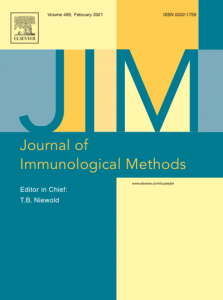Official Journal of the
Association of Medical Laboratory Immunologists
Editor-in-Chief, T.B. Niewold
Associate Editor, Amir A. Sadighi Akka
The Journal of Immunological Methods is devoted to covering techniques for: (1) Quantitating and detecting antibodies and/or antigens. (2) Purifying immunoglobulins, cytokines and other molecules of the immune system. (3) Isolating antigens and other substances important in immunological processes. (4) Labelling antigens and antibodies. (5) Localizing antigens and/or antibodies in tissues and cells. (6) Detecting, and fractionating immunocompetent cells. (7) Assessing adaptive immunity. (8) Documenting cell-cell interactions. (9) Initiating immunity and unresponsiveness. (10) Transplanting tissues. (11) Studying innate immunity. (12) Molecular techniques for studying immune cells and their receptors. (13) Imaging of the immune system. (14) Development and validation of clinical laboratory tests.
In addition the journal will publish articles on novel methods for analysing the organization, structure and expression of genes for immunologically important molecules such as immunoglobulins, T cell receptors and accessory molecules involved in antigen recognition, processing and presentation. Submitted full length manuscripts should describe new methods of broad applicability to immunology and not simply the application of an established method to a particular substance – although papers describing such applications may be considered for publication as a short Technical Note. Review articles will also be published by the Journal of Immunological Methods. In general these manuscripts are by solicitation however anyone interested in submitting a review can contact the Editor-in-Chief and provide an outline of the proposed review.
A Computational Methods Section reflects the increasingly central role of sophisticated statistical and mathematical methods and computational models in the analysis, visualization, interpretation of the results of techniques and investigations within the general scope of the Journal.
These methods can generally be divided into data-driven Immunomics methods involving high throughput assays or model-driven methods that provide a framework for data analysis, visualization, and interpretation. Descriptions of high-quality immunological databases are also of interest.
This Section will publish papers that present important advances to current practice or new “gold standards” for mathematical and computational methods and analyses in the field of immunology. Areas of interest reflect the general areas of interest of the Journal, particularly novel methods for analyzing the organization, structure and expression of genes and proteins of immunologically important molecules such as immunoglobulins, T cell receptors, and various accessory molecules involved in antigen recognition, processing, and presentation, and inflammation.
Since 2020, JIM has sponsored the following three AMLI Abstract Awards on an annual basis: the Young Investigator Award, the Doctorate Award, and the Laboratory Scientist Award.


